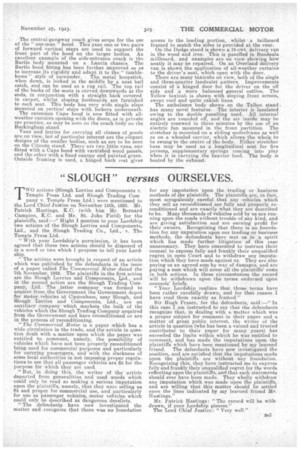" SLOUGH " versus OURSELVES.
Page 45

If you've noticed an error in this article please click here to report it so we can fix it.
TWO actions (Slough Lorries and Components v. Temple Press Ltd. and Slough Trading Corn pany v. Temple Press Ltd.) were mentioned to the Lord Chief Justice on November 15th, 1923. Mr. Patrick Hastings, K.C. (with him Mr. Bernard Campion, K.C. and Mr. St. Jahn Field) for the plaintiffs, said :—" Might I mention to your Lordship two actions of the Slough Lorries and Components, Ltd., and the Slough Trading Co., Ltd., • v. The Temple Press Ltd.
"With your Lordship's permission, it has been agreed that these two actions should be disposed of in a word or two which I propose to tell your Lordship.
" The actions were brought in respect of an article which was published by the defendants in the issue of a paper called The Commercial Motor dated the 7th November, 1922. The plaintiffs in.the first action are the Slough Lorries and Components, Ltd., and in., the second action are the Slough Trading Company, Ltd. The . latter company was formed to acquire from the Government the Government depot for motor vehicles at CipPenham, near Slough, and Slough Lorries and Components, Ltd., are an auxiliary company which markets the bulk of the vehicles which the Slough Trading Company acquired from the Government and have reconditioned or are in the process of reconditioning. "The Commercial Motor is a paper which has a wide circulation in the trade, and the article in question dealt with a matter.upon which the paper was entitled to comment, namely, the possibility of vehicles which have not been properly reconditioned being used for commercial purposes and particularly for carrying passengers, arid with the slackness of some local authorities in not imposing proper regulations to see that all passenger vehicles are fit for the purpose for which they are used.
"But, in doing this, the writer of the 'article departed* from generalities and used words which could only he read as making a serious imputation upon the plaintiffs, namely, that they were selling as fit and proper for commercial use, and particularly for use as passenger vehicles, ,motor vehicles which could only be described as dangerous derelicts. "The defendants have now investigated the matter and, recognize that there was no foundation
for any imputation upon the trading or business methods of the plaintiffs. The plaintiffs are, in fact, most scrupulously careful that any vehicles which they sell as reconditioned are fully and properly reconditioned and are exactly what they are described to be. Many thousands of vehicles sold by us are running upon the roads without trouble of any kind, and are giving satisfaction and are earning profit for their owners. Recognizing that there is no foundation for, any imputation upon our trading or business methods, the defendants have met us in a spirit which has made further litigation of this case unnecessary. They have consented to instruct their counsel to express fully and frankly their unqualified regret in open Court and to withdraw any imputation which they have made against us. They are also paying us an agreed sum by way of damages, and are paying a sum which will cover all the plaintiffs' costs in both actions. In these circumstances the record will be withdrawn upon the terms endorsed upon counsels' briefs.
" Your Lordship realizes that those terms have been rather carefully drawn, and for that reason I have read them exactly as frarhed."
Sir Hugh Fraser, for the defendants, said :—" In this case I am instructed to say that the defendants recognize that, in dealing with a matter which was a proper subject for comment in their paper and a matter of great public interest, the writer of the article in question (who has been a valued and trusted contributor to their paper for many years) has exceeded the limits within which he was entitled to comment, and has made the imputations upon the plaintiffs which have been mentioned by my learned friend. The defendants have now investigated the position, and are satisfied that the impittations made upon. the plaintiffs are without any foundation. Recognizing this, they have instructed me to express fully and frankly their unqualified regret for the words reflecting upon the plaintiffs, and that such statements should ever have been made. They wholly withdraw any imputation which was made upon the plaintiffs, and are willing that this matter should be settled unon the lines indicated by my learned friend Mr. Hastings." Mr. Patrick Hastings: "The record will be withdrawn if your Lordship pleases."
The 'Lord Chief Justice: " Very well."








































































